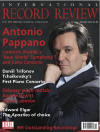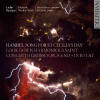Texte paru dans: / Appeared in:
*

International Record Review - 36:4 (03-04/2013)
Pour
s'abonner / Subscription information
Delphian
DCD34110

Reviewer: John T Hughes
In our March 2011 issue I
praised Ludus Baroque’s recording debut: Handel’s Alexander’s Feast,
with Sophie Bevan, Ed Lyon and William Berger (don’t tell me that I didn’t
persuade you to buy it), and many of the general comments which I made then
are relevant to this new release. It presents the same tenor, but Bevan has
given way to her younger sister Mary. The vocal complement of Ludus Baroque
is 6-4-4-5 with 2 1 instrumentalists.
Delphian offers a generous ration of Handel: five seconds short of 80 minutes, and if I should have preferred a third vocal work to the concerto, the package is clearly labelled (not a disc which proposes ‘arias of’ then includes three voiceless pieces with no indication on the outside of the CD case). Once again, the performances are of a high standard.
The Concerto grosso is recorded clearly, and one can follow the low bass without its being too pronounced. The solemn beginning of the opening Largo is nicely caught before the tempo increases to Allegro, but it is the fourth movement, the Andante, that I like particularly, with the richness of the strings most noticeable. This work separates the two vocal compositions, the first in one being Ode on St Cecilia’s Day or Song for St Cecilia’s Day as the booklet has it.
On November 22nd, 1739, at the Theatre Royal in London’s Lincoln’s Inn Fields, Elisabeth Duparc (‘La Francescina’) and John Beard, both of whom created a number of roles for Handel, sang in the first presentation of this setting of John Dryden’s ode. What a concinnous work this is, with verses praising the martial trumpet, the ‘sharp violins’ and ‘the soft complaining flute’ among the instruments, and well can the soprano ask ‘What passion cannot Music raise and quel1?’, to which David Kimbell, in his helpful notes, answers that ‘it can raise and quell them all’.
Ludus Baroque acquits itself admirably in both its functions, with instrumental exponents stylishly playing, whether in a group or in single contributions. The choral side produces fresh sounds. (Are these mainly young singers?) I should have liked to have heard the alto line more clearly (perhaps a fifth person added), but that is often the case in choirs. Richard Neville-Towle draws engaging playing and singing from his forces. The reverberation of Edinburgh’s Canongate Kirk is noticeable but does not distort the solo voices, which is a blessing, as Bevan and Lyon serve the music laudably.
She has a clean, limpid tone, which sits well in Handel’s arias, smooth but not pale, shining but not glaring, be it in the long, slow piece ‘What passion’ , mentioned two paragraphs back, in the brief ‘ Orpheus could lead the savage race’ with its divisions, marked ‘Alla hornpipe’ , or in ‘The soft, complaining flute ‘, containing some neat trills. Lyon is a lyric tenor whom I have praised before in print. Among his positive points are his natural singing and enunciation, his clean articulation of rapid notes and a pleasing tone. Notice the urgency which he injects into the cries of ‘Charge, charge’ in ‘The Trumpet’s loud clangour’, his use of the appoggiatura and little decorative touches. His share of the work is less than the soprano’s but it includes two vigorous arias: that of the trumpet and ‘ Sharp violins proclaim’, the latter also with long melismas and one bar in which is a downward octave leap then a rise to the initial note followed by a second downward plunge.
They seem almost child’s play compared with the third work on the CD. Look down, harmonious Saint is a cantata dating from 1736. After two short recitatives is the aria ‘Sweet accents all your numbers grace’, which Kimbell describes as ‘one of the longest and most virtuosic Handel ever wrote for the tenor voice’. Lyon meets the challenge and moves successfully through its long divisions cleanly, helped by a good supply of breath, which enables him to encompass two or three 16-second runs. In both vocal compositions, gentle ornamentation is employed in the da capo of arias by each soloist, neatly executed.
The booklet supplies information on Bevan, Lyon and
Neville-Towie and photos from the sessions. The words are also included,
rounding off a rewarding disc from this independent Scottish company.
Fermer la fenêtre/Close window
Cliquez l'un ou l'autre
bouton pour découvrir bien d'autres critiques de CD
Click either button for many other reviews


